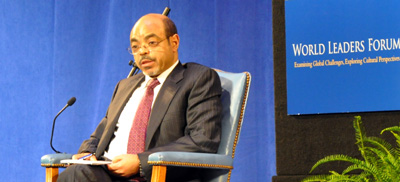On Wednesday, just a few hours before Ethiopian Prime Minister Meles Zenawi delivered the keynote address at the World Leaders’ Forum at New York’s Columbia University, two journalists back in Addis Ababa endured nearly seven hours of police interrogation.
Ethiopian federal police summoned the editors of Sendek, a weekly Amharic-language newspaper, ostensibly to investigate whether the paper has a publishing license. “We already have a license. I don’t know why they summoned us,” Editor-in-Chief Firew Abebe, one of the two, told me today. Local journalists believe Sendek and three other private newspapers are drawing police attention because they published interviews with an opposition leader named Leggese Biratu.
In the interviews, Biratu, who recently resigned from a leadership post in the opposition Coalition for Unity and Democracy, accused party chairman Ayele Chamiso of aligning with Zenawi’s ruling party.
Wednesday’s interrogation is no aberration, CPJ research shows, and it highlights the severe restrictions facing Ethiopian journalists whenever they tackle sensitive political issues.
In his speech here in New York, Zenawi asserted that Africans enjoy more freedom than ever in choosing their destiny. “The fact that Africans now have a choice is … fundamentally liberating,” he said.
Following the speech, in a Q&A session moderated by Mamadou Diouf, director of Columbia’s Institute of African Studies, I asked Zenawi to reconcile the gap between his words and his administration’s record of press and Internet repression. “Should we really take you at your word when your country is known to restrict the press and the websites that Ethiopians might read?”
After a 10-second pause, Zenawi declared: “I think choice is important and fundamental to every human being’s free impression of himself.” Speaking of his days as a guerrilla freedom fighter, he added “I believe I have contributed my fair share to fighting the systems in Ethiopia that were unmistakably oppressive.” He then suggested critics in the Ethiopian press were disgruntled supporters of the former Derg regime. “We had to step on some toes.” When someone else asked about the government’s jamming of the Amharic-language service of Voice of America, he said Ethiopia was following the spirit of a 1940s U.S. law prohibiting VOA from broadcasting domestically.
The prime minister faced tough questioning on other issues–including his party’s incredible 99-percent sweep of May parliamentary elections and the imprisonment of opposition leader Birtukan Mideksa. Zenawi said he appreciated the concerns of the questioners but declared they had had “inadequate chance to consider” the reality in his country.
Across Broadway, two rival groups of Ethiopian expatriates, a bus load each, offered cheers and jeers for Zenawi–evidence, perhaps, of the differences seen in the reality back home.
